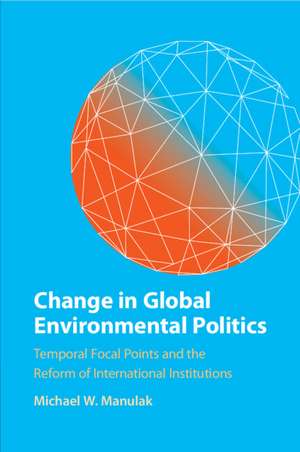Change in Global Environmental Politics: Temporal Focal Points and the Reform of International Institutions
Autor Michael W. Manulaken Limba Engleză Paperback – 25 oct 2023
| Toate formatele și edițiile | Preț | Express |
|---|---|---|
| Paperback (1) | 200.47 lei 3-5 săpt. | +16.72 lei 7-11 zile |
| Cambridge University Press – 25 oct 2023 | 200.47 lei 3-5 săpt. | +16.72 lei 7-11 zile |
| Hardback (1) | 641.47 lei 6-8 săpt. | |
| Cambridge University Press – 11 mai 2022 | 641.47 lei 6-8 săpt. |
Preț: 200.47 lei
Nou
Puncte Express: 301
Preț estimativ în valută:
38.36€ • 40.24$ • 31.93£
38.36€ • 40.24$ • 31.93£
Carte disponibilă
Livrare economică 11-25 martie
Livrare express 25 februarie-01 martie pentru 26.71 lei
Preluare comenzi: 021 569.72.76
Specificații
ISBN-13: 9781009165891
ISBN-10: 1009165895
Pagini: 322
Ilustrații: 2 b/w illus. 6 tables
Dimensiuni: 229 x 152 x 21 mm
Greutate: 0.44 kg
Editura: Cambridge University Press
Colecția Cambridge University Press
Locul publicării:Cambridge, United Kingdom
ISBN-10: 1009165895
Pagini: 322
Ilustrații: 2 b/w illus. 6 tables
Dimensiuni: 229 x 152 x 21 mm
Greutate: 0.44 kg
Editura: Cambridge University Press
Colecția Cambridge University Press
Locul publicării:Cambridge, United Kingdom
Cuprins
1. Introduction: Institutional suboptimality in world politics; 2. It's about time: Explaining change in UN environmental institutions; 3. The Stockholm conference and institutional change; 4. UNEP and the 1982 Nairobi conference; 5. The Brundtland commission and the seeds of change; 6. The Rio conference and institutional change; 7. Post-UNCED UN environment institutions; 8. Conclusion.
Recenzii
'A stimulating and thoughtful contribution to our understanding of how great international decisions get taken. Professor Manulak brings theory and sound historical analysis together to show how gradual change can culminate in decisive and surprising shifts. His work has valuable lessons for policy-makers dealing with climate change today.' Margaret MacMillan, Emeritus Professor of International History, University of Oxford
'As we stare down at the triple planetary crisis of climate change, biodiversity loss and pollution and waste, the stakes have never been higher for multilateral action. Michael W. Manulak's engaging book provides a comprehensive overview of five decades of global environmental politics and affords us important insights into reinvigorating multilateralism to address challenges of a dynamic world.' Inger Andersen, United Nations Under-Secretary-General and Executive Director of the UN Environment Programme
'In this original and fascinating work, Michael W. Manulak expands our understanding of the dynamics and evolution of global environmental governance. Drawing on a set of compelling historical case studies, he shows how high-profile multilateral events, in and of themselves, can drive institutional breakthroughs, by focusing the minds of policymakers and reinforcing convergent expectations about the possibility-and desirability-of new forms of international cooperation.' Stewart M. Patrick, James H. Binger Senior Fellow in Global Governance and Director of the International Institutions and Global Governance Program, Council on Foreign Relations
'Scholarship on international institutions has paid insufficient attention to temporality: explaining when successful initiatives occur. Michael W. Manulak fills this important gap in the literature with his account of temporal focal points: salient moments in time around which negotiations can coalesce. Change in Global Environmental Politics: Temporal Focal Points and the Reform of International Institutions, which focuses in detail on environmental agreements, makes an important contribution to our understanding of international institutional change.' Robert O. Keohane, Princeton University (emeritus)
'Manulak's book offers the tools for understanding, explaining, and creating system-wide and long-lasting change. It provides well-evidenced arguments which call for broader attention to timing in social sciences and serves as an insightful repertoire of lessons for change entrepreneurs; mapping past conditions that have facilitated change and inviting them to prepare and be ready to seize upcoming opportunities.' Simon Beaudoin, Environmental Politics
'As we stare down at the triple planetary crisis of climate change, biodiversity loss and pollution and waste, the stakes have never been higher for multilateral action. Michael W. Manulak's engaging book provides a comprehensive overview of five decades of global environmental politics and affords us important insights into reinvigorating multilateralism to address challenges of a dynamic world.' Inger Andersen, United Nations Under-Secretary-General and Executive Director of the UN Environment Programme
'In this original and fascinating work, Michael W. Manulak expands our understanding of the dynamics and evolution of global environmental governance. Drawing on a set of compelling historical case studies, he shows how high-profile multilateral events, in and of themselves, can drive institutional breakthroughs, by focusing the minds of policymakers and reinforcing convergent expectations about the possibility-and desirability-of new forms of international cooperation.' Stewart M. Patrick, James H. Binger Senior Fellow in Global Governance and Director of the International Institutions and Global Governance Program, Council on Foreign Relations
'Scholarship on international institutions has paid insufficient attention to temporality: explaining when successful initiatives occur. Michael W. Manulak fills this important gap in the literature with his account of temporal focal points: salient moments in time around which negotiations can coalesce. Change in Global Environmental Politics: Temporal Focal Points and the Reform of International Institutions, which focuses in detail on environmental agreements, makes an important contribution to our understanding of international institutional change.' Robert O. Keohane, Princeton University (emeritus)
'Manulak's book offers the tools for understanding, explaining, and creating system-wide and long-lasting change. It provides well-evidenced arguments which call for broader attention to timing in social sciences and serves as an insightful repertoire of lessons for change entrepreneurs; mapping past conditions that have facilitated change and inviting them to prepare and be ready to seize upcoming opportunities.' Simon Beaudoin, Environmental Politics
Notă biografică
Descriere
In a period of planetary crisis, this book shows how large-scale change occurs in global environmental politics.
